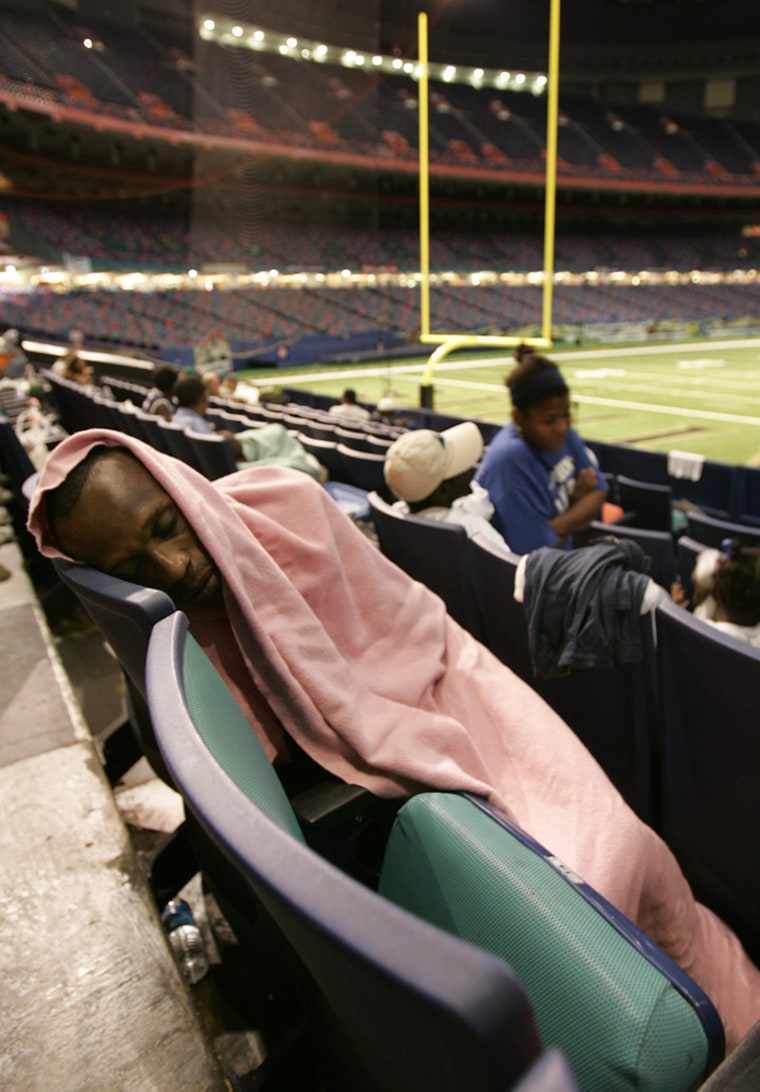They sat just yards from the high-tech football field. A shabby crowd in high-priced seats, huddled together, cold and miserable. Rather than a football team, they cheered the news they would get a hot meal, that blankets were on the way, that there was an area where they could smoke.
These are the last people anyone worried about. The poor, the homeless, the aged, the infirm. People with nowhere to go and no way to get there. Stranded and frightened, they finally found shelter in the Louisiana Superdome and rode out Hurricane Ivan in a joyless night, uncomfortable, but at least safe.
“This isn’t the place I want to be, but it’s the place I’m very grateful to be,” said Leonard Cooper, a homeless man.
About 1,100 people took refuge in the 72,000-seat stadium, and they were confined to one end zone and the concourse behind it. Although they were told to bring food, drinks and blankets with them, only a few families did. The majority of the refugees were homeless and had nothing to bring.
“I wanted to evacuate,” joked Fred Wilson. “But my chauffeur was off today.”
Superdome general manager Doug Thornton laid down the ground rules early: Be polite, put trash in the bins, keep the restrooms clean, smoke only in the designated area.
The only other time the Superdome was used as a shelter, in 1998, people raided the luxury suites before leaving, taking furniture and televisions. This time 300 National Guardsmen were on patrol and there were no problems.
A fine dining experience
The sheriff’s office sent over spaghetti and meatballs for dinner — served with slices of white bread.
“This is the best I’ve eaten in a while,” said Joe Maris, as he lined up for thirds.
Catholic Charities sent over a big supply of bottled water which was available in the concourse. There were also oatmeal bars, chips, orange juice, snack-size pudding and 8,000 packages of cheese crackers.
There was constant activity on the concourse. People went in and out of the bathrooms, smokers headed in and out to smoke, children wandered around looking. A man with one shoe on walked up and down holding his enlarged stomach. An old man asked a National Guardsman if he could get a cane.
“I lost mine and sometimes I fall over without one,” he said.
People smiled and talked. A woman helped the old woman next to her spread out a blanket. Another held a baby for the mother so she could eat.
Medical emergencies
At 9 p.m. Thornton got on his cell phone trying to get a doctor to come from the medical evacuation area to the general area. Two men were having seizures, suspected to be from drug withdrawal.
Charmaine Wallace was worried about her 7-month-old baby, Charel. The baby had a 101-degree fever, was coughing and had a rash on her cheeks. An hour later mother and baby were loaded into an ambulance and taken to Charity Hospital, just blocks away. The two men left in other ambulances.
Arthur Feldman left on his own. He didn’t like the food and the Superdome was too cold.
The temperature was 65 degrees. The building was being cooled for the Saints game against the San Francisco 49ers on Sunday.
“If we warm it up, we won’t have enough time to cool it back down before the game,” said Thornton, who was besieged by shivering refugees with questions about the promised blankets.
Thornton and Gen. Ralph Lupin began phoning the National Guard headquarters and the Red Cross headquarters, trying to secure blankets, which were eventually delivered and allowed people to find places to sleep.
People wrapped themselves in blankets and tried to get comfortable. Because the armrests don’t move, people had to sit in one seat and drape their legs over the armrest into another. Others lay on the floor in front of the seats.
For one, no repeat performance
“I should have stayed home,” said LaShone Johnson. “This is the first time I ever came to a shelter and I’ll never do it again. A lot of these people haven’t bathed in a while. It doesn’t smell too good in here.”
By midnight people had settled down, but it was not quiet. Babies cried, mothers yelled at youngsters, sleepers moaned and shouted, and a constant parade of people climbed up and down the steps to the bathrooms.
The hours crept by until the National Guard started bringing in the breakfast bags and people began getting up, looking tired and uncomfortable. Blankets were turned in. Many of the homeless hurried off to the agency that hires temporary workers each morning. Families gathered their belongings and headed to the street, waiting for the buses to take them back to their neighborhoods. They were greeted by bright sunshine and gentle breezes — Ivan had bypassed the city.
“We wanted to evacuate, but we both had to work right up until yesterday,” said D’Artagnan Wilson, who came with his wife, mother-in-law and five children. “It was uncomfortable, but at least it was safe.”
